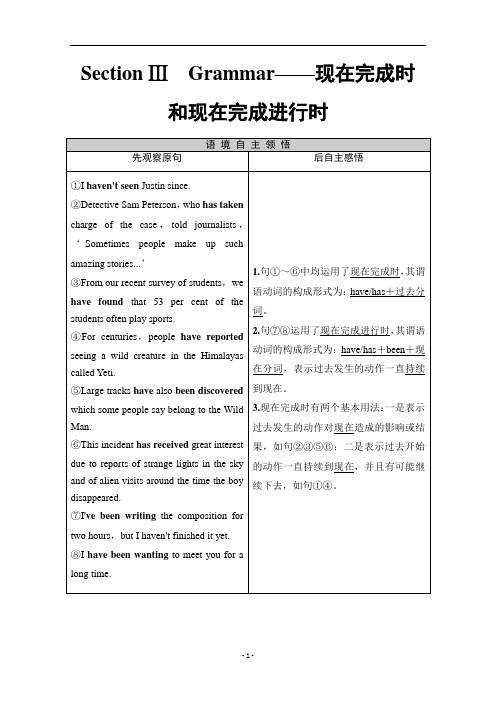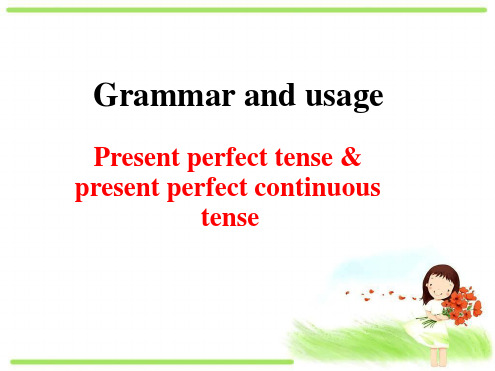18 19Unit1SectionⅢGrammar现在完成时和现在完成进行时
译林版高中英语必修2讲义Unit 1 Section Ⅲ Grammar——现在完成时和现在完成进行时

Section ⅢGrammar——现在完成时和现在完成进行时一、现在完成时1.现在完成时的用法(1)表示过去发生的动作产生的结果或对现在造成的影响。
动作虽然发生在过去,但落脚点在现在。
I've forgotten his telephone number.我忘记了他的电话号码。
(没法联系他了)I haven't finished reading this book yet,so I can't return it to the library.这本书我还没有看完,所以不能把它还给图书馆。
(2)表示动作或状态从过去某时开始一直延续到现在,并可能延续下去。
常与so far,by now,up to now,since,for a long time,up till now,in the past/last few years 等表示一段时间的状语连用。
He has worked here for twenty years by now.到现在为止,他已经在这儿工作20年了。
Up to now,we have received no letters from her.到现在为止,我们没有收到她一封信。
[名师点津](1)该用法中的动词多是延续性动词,不能是非延续性动词或趋向动词。
(2)非延续性动词用于否定句可以表示否定的状态,故可以用来表示状态的持续。
(3)由since引导的时间状语中,since后面的时间名词必须是“时间点”,而不能是“时间段”;而for短语中的时间名词必须是“时间段”(有时for可省去)。
I've known him since 1980.我从1980年就认识他了。
I have learnt English (for) many years.我学英语已很多年了。
[即时演练1]用所给动词的适当形式填空①The price has gone (go)down,but I'm not sure whether it will remain so.②All the windows have been painted (paint),and they look new.③I have read (read)many reports about the UFO recently.④In the last few years,China has made (make) great achievements in environmental protection.⑤His first novel has received (receive) good reviews since it came out last month.2.现在完成时的常用句型(1)It/This is the first/second/...time that+主语+谓语部分(常用现在完成时)(2)It has been+一段时间+since...(3)It/This/That is the+最高级+名词+定语从句(定语从句常用现在完成时)It is the first time that I've heard of the story about Crop Circles.这是我第一次听说麦田怪圈的故事。
完成进行时与完成时ppt课件

I think you are right. 我认为你是对的。
She’s thinking about the problem. 她正在思考那个问题。
(2) 常见的时间状语: at this time, at this moment
Exercise II
1. Hurry up, or we ________ (miss) the plane. 2. Do you know the earth _______ (go) round
Exercise I(单项选择)
1. Even though they ___ for twenty years, the two neighbors do not get on well with each other.
A. have been lived side by side
B. had been living side by side C. have been side by side living
at the end of next semester. 如:There will be a meeting next month.
(2)常用”be going to+动词原形”的结构表示 主语的主观想法或打算,如:
We’re going to have a trip in Hawaii.
进行时的用法
将来
过去 将来
一般将来时
将来完成时
将来进行时
I shall/will do I shall/will have I shall/will be
done
doing
一般过去将来 时
过去将来 完成时
现在完成时和现在完成进行时的区别优秀ppt课件

Practice one
Mr. Wolf
---Mr. Wolf, what have you been busy with these days? ---I _h_a_v_e_b_e_e_n__tr_y_i_n_g__ (try) to catch goats, but _h_a_v_e__ never __c_a_u_g_h__t (catch) a single one so far.
1. To talk about things that happened in the recent past but are connected with the present.
分析:过去的动作: got a new pair of glasses 对现在的影响: see more clearly.
总结:表示过去的动作对现在的影响
常跟already, yet 等连用
Watch and think
Usage 2
I have been to Paris twice.
2. To talk about unfinished repeated actions in a lifetime. 总结:表示反复的动作,经验
Grammar and usage
Present perfect tense & present perfect continuous
tense
Present perfect tense
? The monitor has changed his seat, so I can't find him.
I will be back soon!
? It's __b_e_e_n__ a long day without you my friend. And I'll tell you all about it when I see you again.
现在完成时与现在完成进行时ppt课件

1)
这两个时态的主要差别 是,现在完成时表示动作 已完成, 而完成进行时却 不一定如此:
I’ve made a cake. 我做了一个蛋糕。
(已做好) I’ve been making a cake. 我一直在做一个 蛋糕。 (不一定做好了) She’s painted a picture. 她画了一幅画。 (已画好) She’s been painting a picture. 她在画一幅 画。(可能还没画好)
• 但当意思发生转变时也可能用于完成进行时: I’ve been thinking of doing so for a long time. 我 好久以来一直想这样做。 Tom has been seeing about a work permit for you. 汤姆一直在设法帮你取得工作许可证。 Which judge has been hearing the case? 哪位法 官在审这个案子? She has been having a tooth out. 她在拔牙。 The children have been looking forward to this holiday for months. 孩子们好几个月来一直盼望 着这个节日。 :
• want 这个动词有时可用于完成进行时,表 示“一直想”: You’re the very man I’ve been wanting to meet. 你正是我一直想见的人.
• 3) 有少数动词用两种时态都可以,意思差 别不大,如: They have been working very well this term. 这学期他们学习很好。 They have worked very well this term. • It has been raining for two hours. 下了两个 小时的雨。 It has rained for two hours. • I have been hearing from her regularly. 我 定期收到她的来信。 I have heard from her regularly.
2018-2019学年高一英语人教版必修一课件:18-19 Unit 3 Section Ⅲ Grammar——现在进行时

3.be to do 表示预定、按计划或安排将要发生的动作。 They are to get married next month.他们下个月就要结婚了。 4.be about to do 意为“刚要,正要”,表示非常近的将来。 be about to do 不能和表示将来时间的副词连用。 She was about to leave when some guests came. 她刚要离开,这时来了一些客人。
二、现在进行时表示将来的用法 1.动词 come,go,arrive,leave,start,begin,return 等的现 在进行时可以表示将来的动作,常有“意图”“安排”或“打算” 的含义。这种用法比较生动,给人一种期待感。它常表示最近或较 近的将来会发生的动作。 They are coming here this afternoon. 他们今天下午来这儿。 When are you leaving? 你们什么时候动身?
[即时演练 2] ①我明天要离开。 I tomorrow.
②他什么时候到车站? When the station?
③下星期天你打算干什么? What next Sunday?
④我妈妈不久将给我买辆自行车。 My mother me a bike soon.
【答案】 ④is buying
①am leaving ②is he getting to/arriving at
5.一般现在时也可以表示将来。通常用于状语从句中或按规定 (时刻表、 计划表、日程表等)将要发生的动作。 The next plane leaves at 6:00 p.m. 下一次航班晚上 6 点起飞。
温馨提示:其中有一些动词一般不用于进行时。 (1)表示人的心理状态、情感的动词 want,mind,wish,recognize,know, understand,hate,fear 等。 (2)表存在或位置的词:remain,stand 等。 (3)表示知觉的动词:see,hear,notice,smell 等。 (4)表示所属的词:have,possess,own,consist of 等。 (5)暂时性的动词:accept,allow,decide,promise 等。
现在完成时与现在完成进行时ppt课件

04
两者之间的比较和区别
https://
时态的比较
总结词
现在完成时与现在完成进行时在时态上有显著差异。
详细描述
现在完成时表示动作已经完成,并对现在产生影响;而现在完成进行时则强调 动作的延续性,即动作从过去一直持续到现在,可能仍在进行中。
用法的比较
总结词
两者在用法上存在差异。
详细描述
现在完成时主要用于描述已经完成的动作或状态,并强调对现在的影响;而现在 完成进行时则强调动作的持续性,以及动作的未完成状态。
语气的比较
总结词
现在完成时与现在完成进行时的语气 有所不同。
详细描述
现在完成时的语气较为肯定,表示动 作已经完成;而现在完成进行时的语 气则较为委婉,表示动作还在进行中, 或者还未完成。
两年。)
We have seen that movie before.(我们以前看过那部电
影。)
03
现在完成进行时的定义和 用法
https://
定义
定义
现在完成进行时表示动作从过去某个时间开始, 一直持续到现在,并且有可能继续持续下去。
结构
have/has + been + -ing
两者区别
现在完成时强调动作的结果,而现 在完成进行时强调动作的过程。
回顾学习过程中的重点和难点
重点
理解两种时态的用法和区别,掌握其基本结构和用法。
难点
正确区分现在完成时和现在完成进行时的使用场景,避免混 淆。
提供学习建议和方向
要点一
建议
多做练习题,通过实际运用加深对两种时态的理解。
要点二
方向
进一步学习其他英语时态,建立完整的英语时态体系。
现在完成时和现在完成进行时有什么区别

现在完成时和现在完成进行时有什么区别现在完成时(Present perfect)过去发生并且已经完成的动作对现在造成影响或后果,过去某一时间开始并一直持续到现在的动作或状态。
(1)强调动作是过去发生的(2)强调对现在的影响或结果(3)在过去不确定的时间里发生的动作,但是结果对现在有影响。
现在完成进行时其表达的意思有两种:1.表示从过去某时开始一直持续到现在的动作,并且还将持续下去。
2.表示在说话时刻之前到现在正在进行的动作。
现在完成进行时其构成形式如下: I / we / they have been + 动词的现在分词He / she / it has been + 动词的现在分词功用如下: 1)表示一个在过去开始而在最近刚刚结束的行动,如:Ann is very tired. She has been working hard.Why are you clothes so dirty? What have you been doing?2) 表示一个从过去开始但仍在进行的行动,如:It has been raining for two hours. (现在还在下)Jack hasn’t been feeling very well recently.3) 表示一个从过去开始延续到现在,可以包括现在在内的一个阶段内,重复发生的行动,如:She has been playing tennis since she was eight.4) 现在完成时强调动作行为的结果、影响,而现在完成进行时只强调动作行为本身,如: Tom’s hands are very dirty. He has been repairing the car. The car is going again now. Tom has repaired it.注意:现在完成时有否定结构、而现在完成进行时没有否定结构。
现在完成时态可表示做完的时期以及已有的经验、但现在完成进行时不可以A) 表示动作到现在为止已经完成或刚刚完成。
高中英语一轮复习语法第18讲:现在完成时和现在完成进行时

高中英语一轮复习语法现在完成时和现在完成进行时英语的时态是一种语法范畴,是表示各种时间和动作方式的动词形式。
将时间与动作方式组合在一起,即构成16种时态。
其中,现在完成时的构成形式为:have/has+过去分词;其中,现在完成进行时的构成形式为:have/has been+现在分词。
本章从现在完成时和现在完成进行时的形式开始,逐步讲解其用法和注意事项。
典型例句:1.She has had a headache all day. 现在完成时他头疼了一整天。
2.We have just had an English lesson. 现在完成时我们刚刚上了一堂英语课。
3.He has been reading the novel for two hours. 现在完成进行时他看这本小说看了两个小时了。
1.现在完成时现在完成时描述的是过去发生而与现在情况有关的动作或状态,或是描述从过去某时到现在为止这一段时间中发生的情况,换言之,现在完成时表现的是从过去到现在的事情。
一、现在完成时的形式现在完成时由“have/has+过去分词”构成。
has用于第三人称单数,have用于第一、二人称单数及第三人称复数。
其否定句形式是在have/has后加not,一般疑问句形式是将have/has 提前,特殊疑问句形式则分为两种情况。
1.现在完成时的肯定句1第 1 页共 31 页句型:主语(I/we/you/第三人称复数)+have+过去分词+……主语(第三人称单数)+has+过去分词+……I have lived in Beijing for several years.我在北京已经住了几年了。
We have invited them to our school to give a talk about the history of the Olympic Games.我请他们来我们学校作关于奥林匹克运动会发展历史的报告。
- 1、下载文档前请自行甄别文档内容的完整性,平台不提供额外的编辑、内容补充、找答案等附加服务。
- 2、"仅部分预览"的文档,不可在线预览部分如存在完整性等问题,可反馈申请退款(可完整预览的文档不适用该条件!)。
- 3、如文档侵犯您的权益,请联系客服反馈,我们会尽快为您处理(人工客服工作时间:9:00-18:30)。
Section山Grammar -------- 现在完成时和现在完成进行时[语法精要点拨]、现在完成时1. 现在完成时的用法(1)表示过去发生的动作产生的结果或对现在造成的影响。
动作虽然发生在过去,但落脚点在现在。
rve forgotten his teleph one nu mber.我忘记了他的电话号码。
(没法联系他了)I haven't finished read ing this book ye,so I can't return it to the library. 这本书我还没有看完,所以不能把它还给图书馆。
(2)表示动作或状态从过去某时开始一直延续到现在,并可能延续下去。
常与so far,by now,up to now,since, for a long time,up till now,in the past/last few years等表示一段时间的状语连用。
He has worked here for twenty years by now到现在为止,他已经在这儿工作20年了。
Up to now, we have received!。
letters from her.到现在为止,我们没有收到她一封信。
[名师点津](1) 该用法中的动词多是延续性动词,不能是非延续性动词或趋向动词。
(2) 非延续性动词用于否定句可以表示否定的状态,故可以用来表示状态的持续。
(3) 由since引导的时间状语中,since后面的时间名词必须是“时间点”,而不能是“时间段”;而for短语中的时间名词必须是“时间段”(有时for可省去)。
rve known him since1980.我从1980年就认识他了。
I have learnt En glish (for) many years我学英语已很多年了。
[即时演练1]用所给动词的适当形式填空①The price has gone (go)down but rm not sure whether it will rema in so.②All the windows have been painted (paint) and they look new.③I have read (read)ma ny reports about the UFO rece ntly.④In the last few years,China has made (make) great achievements in en vir onmen tal protectio n.⑤ His first novel has received (receive) good reviews since it came out last mon th.⑥一I remember you were a talented pianist at college.Can you play the piano for me?—Sorry,I haven't played (not play) the piano for years.2. 现在完成时的常用句型(1) It/This is the first/second/...time that+ 主语+谓语部分(常用现在完成时)(2) It has been+一段时间+ si nee...(3) I t/This/That is the +最高级+名词+定语从句(定语从句常用现在完成时) It is the first time that I've heard of the story about Crop Circles. 这是我第一次听说麦田怪圈的故事。
This is the best film(that) I've ever see n这是我所看过的最好的一部电影。
3. 在时间或条件状语从句中,现在完成时可以代替将来完成时If you have done the experimen, you will realize the theory better.如果你做过这个实验,你会更好地理解这个理论的。
4. 现在完成时和一般过去时的区别[即时演练2]用所给动词的适当形式填空①clea nWe cleaned the classroom just now.We have already cleaned the classroom.②workI worked in the factory for 3 years, now I run a restaura nt.I have worked in the factory for 3 years.③一Kevin, you look worried.Anything wrong?——Well, I took (take) a test and rm waiting for the result.二、现在完成进行时1. 现在完成进行时的用法(1)表示动作从过去某一时刻开始一直持续到现在并有可能延续下去,更强调动作的延续性,常与for, since等引出的时间状语连用。
They have been living here for 10 years.他们住在这里10年了。
I have been waiting for you about half an hour.我等你大概半个小时了。
(2) 表示动作的反复性。
They have been discussingi e matter several times this year.他们今年已经数次讨论那件事了。
(3) 表示某种感情色彩。
I have been waiting to see you for a long time.长久以来,我一直等着见你。
[名师点津]表示状态的动词不能用于现在完成进行时。
我认识他已经好几年了。
I have known him for years~)I have bee n knowing him for years. (x)[即时演练3]用所给动词的适当形式填空①一Where is Peter? I can't find him any where.—He went to the library after breakfast and has been writing (write) his essay there ever sin ce.②The girl has a great interest in sport and has been taking (take) badminton classes twice a week over the last three years.③In order to find the missing child , villagers have been doing (do) all they can over the past five hours.2他写了一封信。
(信已写好)He has been writing a letter.他一直在写一圭寸信。
(信尚未完成)Have you met him rece ntly?你最近见过他吗?(现实结果)Have you been meeting him rece ntly?你最近常和他见面吗?(动作的反复)My father has lost his keys.我父亲把钥匙丢了。
(陈述事实)My father has always been losing his keys.我父亲总是丢钥匙。
(“有责怪或无奈”之意)[即时演练4]用所给动词的适当形式填空①That famous painting has been missing (miss) for two weeks now.Police have been looking (look) for it.②I have been writing (write) the book,but I still haven't finished (not finish) it.③They have n ever learnt (lear n) to swim.④We have been looking (look) forward to our summer vacation.[语法应用落实]I .用所给动词的适当形式填空1. Sorry, rm full.1 have had (have) supper already.2. Maria has been learning (learn) English for two years and she does well in it.3. Li Mi ng went (go) abroad last year.We have n't heard (not hear) from each other since the n.4. Hello , Tom.I have been looking (look) for you all morning.Where have you bee n?5. All these years they have been contributing (contribute) articles to our magaz ine.6. How many unexplained stories have you heard (hear)of【导学号:50792019】7. In the past few days the detective has looked/has been looking (look) into the case.8. They have been building (build) the bridge base since last week.9. The boy has not shown (not show) up since he went missing.10. Danny has worked (work) hard for long to realize his dream and now he is popular.n .单句改错(每小题仅有1处错误)1. She lives in Beijing since she came to China.live驴has lived2. They are friends for 10 years.are^ have been3. In the last ten years many cha nges took place in my hometown .too© have taken4. I heard nothing from him up to now.heard前力口have5. His hands are very dirty, because he has painting the door.paintin前力卩been川.完成句子1. 这是我第一次来上海。
